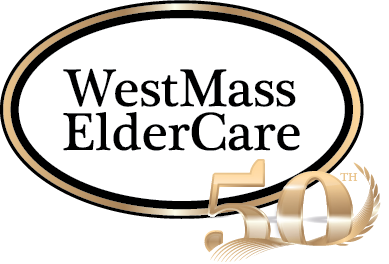
After working for Greater Springfield Senior Services and several different nursing homes throughout her career, Brenda Bronner found her true calling when she became the Director for Home Care Services at WestMass Elder Care in 2001.
“Helping people stay in their own homes has always felt like the right thing to do,” Bronner said. “As a nursing home social worker, I met with residents shortly after their admission, and almost everyone would ask, when can I go home? Nursing homes provide needed care and support for many in our communities, but everyone should have the option of receiving care at home.”
In our featured interview this month, Bronner shares more about what drives her in her role, including the importance of staying connected and supporting her clients.
On Getting Consumers the Help they Need
According to Bronner, WMEC’s Care Managers can offer many resources to help older adults maintain their independence. As just one example, WMEC can assist consumers by helping to pay for technology which helps them communicate, including TracFones when clients run out of minutes for cell phones. The community-based resources available to help consumers, Bronner added, are also vast. For example, The Holyoke Police Department has a specially-assigned elder officer on their staff specifically trained to help do wellness checks, check on clients if the agency is worried for someone, respond to reports of elder abuse, and more. Bronner explained that this is one of the more “unique resources that our staff frequently use to help their consumers,” that not many towns have.
Supporting Consumers and Staying Connected
Continuing the theme of support for consumers, no matter the need, Bronner had a woman call her recently with concerns about service delivery and transportation for medical appointments. In response, Bronner gave her information on a Mobile ER service that fulfilled her need.
“She was very grateful for that information and support,” Bronner said.
Beyond reaching out for information, getting creative can also play a key role in providing care to WMEC consumers. Bronner takes great pride in how WMEC’s Care Managers have “really become experts in community resources,” and partnering with local Councils on Aging (CoA) has helped them share those resources with the community. The agency also works hard on individualizing care and service to each client.
“People have been very isolated and lonely since the start of the pandemic,” she explains. “The service plans we have set up for people are sometimes hard to implement because of COVID. Workers get sick, their family members, and our clients and caregivers get sick. Then, we get creative. How can we still meet this person’s needs? What can we do to support them?”
Bronner shared that it can be tricky to establish trust with some consumers at the beginning, but if “we get our foot in the door” and connect with the consumer by providing a service they are seeking, that makes all the difference. “Once they connect and trust, they come around to considering other services which may benefit them,” she said. “If you get someone to agree to something, you can then offer them additional options.”
On Falls Prevention Efforts
As this month marks Fall Prevention Month, Bronner shared that education is the most significant component in WMEC’s in-home assessments to help clients maintain their safety in their home environment. By taking the time to examine issues with balance and movement, WMEC Care Managers help consumers significantly reduce their risk for falls and hospitalization.
“We share educational information with them at each assessment. Education is continuous,” she explained. “Our in-home assessment includes evaluating an individual for their fall risk. Recommendations for consumers are then developed based on the individual risk assessments and the consumer’s needs, wishes, and preferences.”
A variety of tools help with fall prevention, Bronner added, including foot care referrals, medication reviews, Personal Emergency Response System (PERS), and more. WestMass Elder Care also offers specialized services, including grab bars, walkers, wheelchairs, shower chairs, and ramps.
Final Thoughts
The most important thing clients should know, Bronner said, is to reach out to learn more about WMEC’s services.
“Call us, and we will help you,” Bronner said. “I think we are the experts on what the community resources are. We have so many different services and so many different options.”
To learn more about Home Care Services, email bbronner@wmeldercare.org.
eople stay in their own homes has always felt like the right thing to do,” Bronner said. “As a nursing home social worker, I met with residents shortly after their admission, and almost everyone would ask, when can I go home? Nursing homes provide needed care and support for many in our communities, but everyone should have the option of receiving care at home.”
In our featured interview this month, Bronner shares more about what drives her in her role, including the importance of staying connected and supporting her clients.
On Getting Consumers the Help they Need
According to Bronner, WMEC’s Care Managers can offer many resources to help older adults maintain their independence. As just one example, WMEC can assist consumers by helping to pay for technology which helps them communicate, including TracFones when clients run out of minutes for cell phones. The community-based resources available to help consumers, Bronner added, are also vast. For example, The Holyoke Police Department has a specially-assigned elder officer on their staff specifically trained to help do wellness checks, check on clients if the agency is worried for someone, respond to reports of elder abuse, and more. Bronner explained that this is one of the more “unique resources that our staff frequently use to help their consumers,” that not many towns have.
Supporting Consumers and Staying Connected
Continuing the theme of support for consumers, no matter the need, Bronner had a woman call her recently with concerns about service delivery and transportation for medical appointments. In response, Bronner gave her information on a Mobile ER service that fulfilled her need.
“She was very grateful for that information and support,” Bronner said.
Beyond reaching out for information, getting creative can also play a key role in providing care to WMEC consumers. Bronner takes great pride in how WMEC’s Care Managers have “really become experts in community resources,” and partnering with local Councils on Aging (CoA) has helped them share those resources with the community. The agency also works hard on individualizing care and service to each client.
“People have been very isolated and lonely since the start of the pandemic,” she explains. “The service plans we have set up for people are sometimes hard to implement because of COVID. Workers get sick, their family members, and our clients and caregivers get sick. Then, we get creative. How can we still meet this person’s needs? What can we do to support them?”
Bronner shared that it can be tricky to establish trust with some consumers at the beginning, but if “we get our foot in the door” and connect with the consumer by providing a service they are seeking, that makes all the difference. “Once they connect and trust, they come around to considering other services which may benefit them,” she said. “If you get someone to agree to something, you can then offer them additional options.”
On Falls Prevention Efforts
As this month marks Fall Prevention Month, Bronner shared that education is the most significant component in WMEC’s in-home assessments to help clients maintain their safety in their home environment. By taking the time to examine issues with balance and movement, WMEC Care Managers help consumers significantly reduce their risk for falls and hospitalization.
“We share educational information with them at each assessment. Education is continuous,” she explained. “Our in-home assessment includes evaluating an individual for their fall risk. Recommendations for consumers are then developed based on the individual risk assessments and the consumer’s needs, wishes, and preferences.”
A variety of tools help with fall prevention, Bronner added, including foot care referrals, medication reviews, Personal Emergency Response System (PERS), and more. WestMass Elder Care also offers specialized services, including grab bars, walkers, wheelchairs, shower chairs, and ramps.
Final Thoughts
The most important thing clients should know, Bronner said, is to reach out to learn more about WMEC’s services.
“Call us, and we will help you,” Bronner said. “I think we are the experts on what the community resources are. We have so many different services and so many different options.”
To learn more about Home Care Services, email bbronner@wmeldercare.org.


